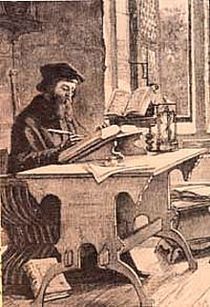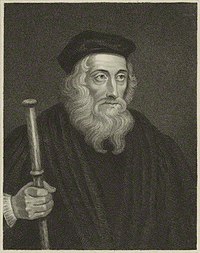John Wycliffe (/ˈwɪklɪf/; also spelled Wyclif, Wycliff, Wiclef, Wicliffe, Wickliffe; c. 1331 – 31 December 1384)[1] was an English scholastic philosopher, theologian, lay preacher, translator, reformer and university teacher at Oxford in England. He was an influential dissident in the Roman Catholic Church during the 14th century. His followers were known as Lollards, a somewhat rebellious movement, which preached anticlerical and biblically-centred reforms. The Lollard movement was a precursor to the Protestant Reformation. He has been characterized as the evening star of scholasticism and theMorning Star of the Reformation.[2] He was one of the earliest opponents of papal authority over secular power. In assessing Wycliffe’s historical role, Lacey Baldwin Smithargues that Wycliffe expounded three doctrines that the established church recognized as major threats. First was his emphasis upon an individual's interpretation of the Bible as the best guide to a moral life, as opposed to the Church’s emphasis on receiving its sacraments as the only way to salvation. Second, he insisted that holiness of an individual was more important than official office; that is, a truly pious person was morally superior to a wicked ordained cleric. Wycliffe challenged the privileged status of the clergy, which was central to their powerful role in England. Finally he attacked the exorbitant luxury and pomp of the churches and their ceremonies.[3]
Wycliffe was also an early advocate for translation of the Bible into the common language. He completed his translation directly from the Vulgate into vernacular English in the year 1382, now known as Wycliffe's Bible. It is probable that he personally translated the Gospels of Matthew, Mark, Luke, and John; and it is possible he translated the entireNew Testament, while his associates translated the Old Testament. Wycliffe's Bible appears to have been completed by 1384, with additional updated versions being done by Wycliffe's assistant John Purvey and others in 1388 and 1395.
Contents
[hide]
[hide]
 John Wycliffe at work in his study
John Wycliffe at work in his study
威克里夫[編輯]
約翰·威克里夫 
出生 西元1320年
英格蘭Ipreswell 逝世 1384年12月31日(享年約64歲)
英格蘭盧多倭(Lutterworth)
約翰·威克里夫(John Wyclif,約1320年—1384年),歐洲宗教改革的先驅。
威克里夫生於英國約克郡,其父親是威克里夫農莊的主人。他於1345年到牛津大學墨頓學院就讀,並於1362年在牛津大學貝利奧爾學院完成碩士學位。其後,他花了9 年時間供讀博士學位,並於1372年正式取得該學位。[1]曾任牛津大學哲學、神學博士,1369年起任英王的侍從神父,1374年受英王委派與教宗代表就英國教會的神職任免權問題進行談判,未達成協議,從此抨擊教宗權力至上。
威克里夫(John Wycliffe)為中世紀末期的改教先驅,於公開場合批評羅馬大公教會所定的各項規條及不合上帝心意的教宗。威氏生於1320年,曾在英國牛津大學皇后學院讀書,於1372年得到了神學博士的學位。之後就在該校任教,學識淵博,但為人不茍言笑。於1376年開始批評聖職人員,原因即是教會過於和執政掌權者親近、政教不分,且生活優渥不愁吃穿,教會腐化的程度超乎想像。對於教宗所立的多項規條也不符合聖經的教導,一切應回歸到聖經,以聖經為信仰生活的準則。另外由於當時聖經所採取的是武加大譯本翻譯出來的拉丁文聖經,人民閱讀不易,故為了大家都能懂得聖經中的意思,威氏於1380到1382年間,[2]與數位朋友將此聖經合譯成英文聖經,同時也將教義等等資料彙總,均以英文來呈現,並帶到英國各地方。但此舉引發教宗及聖職人員的不滿,威氏開始遭受到逼迫,幸賴許多王公貴族及平民百姓支持他,直到過世都未落入逼迫者的手中。[3]威氏曾有一段時間任職於王室,當時英王愛德華三世和教宗貴革利十一世發生衝突,國王仗著國會對他的支持,拒絕效忠教宗,由於威氏早就敵視教宗,於是以寫文章的方式來護衛國王,前後寫了〈教皇分裂(Schisma Place)〉一書,說明了教宗根本不是清心寡慾的使徒;〈聖經真理與實意(On the Truth and Meaning of Scripture)〉一書,提及應將聖經翻譯成英文,真正明白聖經的真理及上帝的旨意,不需要教宗及教會插手其中。當時印刷術尚未發明,整個翻譯的工作是以手抄的方式一段段完成,每抄完一段即流傳出去,最後再做總整理,使完整的英文譯本可以問世。威氏在1384年12月31日中風過世於盧多倭(Lutterworth)。[4]
威克里夫主張各國教會應隸屬於本國國王,教宗無權向國王徵收賦稅,並建議國王沒收教會土地,建立擺脫教廷控制的民族教會。他否認教士有赦罪權,要求簡化教會禮儀。因此,他遭到時任教宗額我略十一世(Gregory XI)的五次譴責及坎特布里大主教的通緝,但獲牛津大學的師生及倫敦市民支持,並得英王的保護。1381年英王與教會共同鎮壓瓦特·泰勒農民起義,威克里夫被迫幽居寫作,把聖經譯成英文,並完成神學著作《三人對話錄》。他主張聖經的權威高於教會,信徒應服從基督而非教會,1384年死於萊斯特郡。三十年後其作品被教會銷毀。在他死後教皇對他的理念或是教訓深惡痛絕,因此在他死後三十年舉行了康士坦會議,頒發了底下的諭令:「……,本神聖會議表明立場,並宣告威克里夫乃聲名狼籍之異端者,至死頑梗不化,不但被逐出教會,而且他所有對他的追思都是有罪的,當將他的骸骨挖出,丟在教會墓園之外,將其他忠誠之死者以示區別。」十二年後,有一位主教發現此令尚未執行,乃於一四二八年將他的骸骨挖出並焚燒,且經他的骨灰丟至史威福(Swift)溪中。雖然威克里夫死後仍遭到這樣焚骨揚灰的對待,但是老湯姆福勒(Tom Fuller)在他的教會歷史裡寫道:「他的骨灰流至亞芬河(Avon),又流至塞芬河(Severn),然後流入海峽,最後流入汪洋大海。就這樣象徵威克里夫之教義的骨灰,如今已散布至各地。」[5]
| 約翰·威克里夫 | |
|---|---|
 | |
| 出生 | 西元1320年 英格蘭Ipreswell |
| 逝世 | 1384年12月31日(享年約64歲) 英格蘭盧多倭(Lutterworth) |
約翰·威克里夫(John Wyclif,約1320年—1384年),歐洲宗教改革的先驅。
威克里夫生於英國約克郡,其父親是威克里夫農莊的主人。他於1345年到牛津大學墨頓學院就讀,並於1362年在牛津大學貝利奧爾學院完成碩士學位。其後,他花了9 年時間供讀博士學位,並於1372年正式取得該學位。[1]曾任牛津大學哲學、神學博士,1369年起任英王的侍從神父,1374年受英王委派與教宗代表就英國教會的神職任免權問題進行談判,未達成協議,從此抨擊教宗權力至上。
威克里夫(John Wycliffe)為中世紀末期的改教先驅,於公開場合批評羅馬大公教會所定的各項規條及不合上帝心意的教宗。威氏生於1320年,曾在英國牛津大學皇后學院讀書,於1372年得到了神學博士的學位。之後就在該校任教,學識淵博,但為人不茍言笑。於1376年開始批評聖職人員,原因即是教會過於和執政掌權者親近、政教不分,且生活優渥不愁吃穿,教會腐化的程度超乎想像。對於教宗所立的多項規條也不符合聖經的教導,一切應回歸到聖經,以聖經為信仰生活的準則。另外由於當時聖經所採取的是武加大譯本翻譯出來的拉丁文聖經,人民閱讀不易,故為了大家都能懂得聖經中的意思,威氏於1380到1382年間,[2]與數位朋友將此聖經合譯成英文聖經,同時也將教義等等資料彙總,均以英文來呈現,並帶到英國各地方。但此舉引發教宗及聖職人員的不滿,威氏開始遭受到逼迫,幸賴許多王公貴族及平民百姓支持他,直到過世都未落入逼迫者的手中。[3]威氏曾有一段時間任職於王室,當時英王愛德華三世和教宗貴革利十一世發生衝突,國王仗著國會對他的支持,拒絕效忠教宗,由於威氏早就敵視教宗,於是以寫文章的方式來護衛國王,前後寫了〈教皇分裂(Schisma Place)〉一書,說明了教宗根本不是清心寡慾的使徒;〈聖經真理與實意(On the Truth and Meaning of Scripture)〉一書,提及應將聖經翻譯成英文,真正明白聖經的真理及上帝的旨意,不需要教宗及教會插手其中。當時印刷術尚未發明,整個翻譯的工作是以手抄的方式一段段完成,每抄完一段即流傳出去,最後再做總整理,使完整的英文譯本可以問世。威氏在1384年12月31日中風過世於盧多倭(Lutterworth)。[4]
威克里夫主張各國教會應隸屬於本國國王,教宗無權向國王徵收賦稅,並建議國王沒收教會土地,建立擺脫教廷控制的民族教會。他否認教士有赦罪權,要求簡化教會禮儀。因此,他遭到時任教宗額我略十一世(Gregory XI)的五次譴責及坎特布里大主教的通緝,但獲牛津大學的師生及倫敦市民支持,並得英王的保護。1381年英王與教會共同鎮壓瓦特·泰勒農民起義,威克里夫被迫幽居寫作,把聖經譯成英文,並完成神學著作《三人對話錄》。他主張聖經的權威高於教會,信徒應服從基督而非教會,1384年死於萊斯特郡。三十年後其作品被教會銷毀。在他死後教皇對他的理念或是教訓深惡痛絕,因此在他死後三十年舉行了康士坦會議,頒發了底下的諭令:「……,本神聖會議表明立場,並宣告威克里夫乃聲名狼籍之異端者,至死頑梗不化,不但被逐出教會,而且他所有對他的追思都是有罪的,當將他的骸骨挖出,丟在教會墓園之外,將其他忠誠之死者以示區別。」十二年後,有一位主教發現此令尚未執行,乃於一四二八年將他的骸骨挖出並焚燒,且經他的骨灰丟至史威福(Swift)溪中。雖然威克里夫死後仍遭到這樣焚骨揚灰的對待,但是老湯姆福勒(Tom Fuller)在他的教會歷史裡寫道:「他的骨灰流至亞芬河(Avon),又流至塞芬河(Severn),然後流入海峽,最後流入汪洋大海。就這樣象徵威克里夫之教義的骨灰,如今已散布至各地。」[5]
Legacy
Wycliffe was instrumental in the development of a translation of the Bible in English, thus making it accessible to laypeople. He also had a strong influence on Jan Hus.[12]
- Wycliffe Bible Translators, one of the world's largest international organizations dedicated to translating the Bible into modern languages is named in honour of John Wycliffe.
- Wycliffe Hall, Oxford, one of the Church of England's designated Evangelical theological colleges.
'The Way, the Truth, the Life' ('Via, Veritas, Vita') is the motto of our final College of the Week - Wycliffe Hall.
Wycliffe Hall was founded in 1877 as an evangelical theological college and named after the master of Balliol in the 14th century, the notable philosopher and theologian John Wycliffe. Today it accepts around 100 students to study theology.




沒有留言:
張貼留言